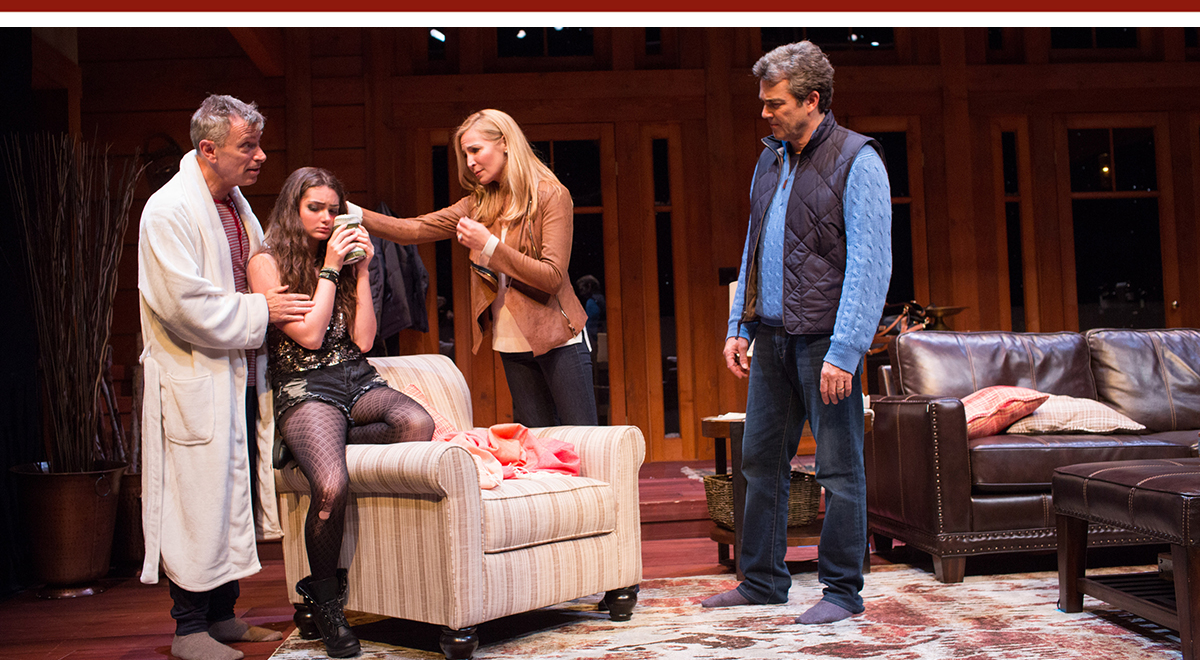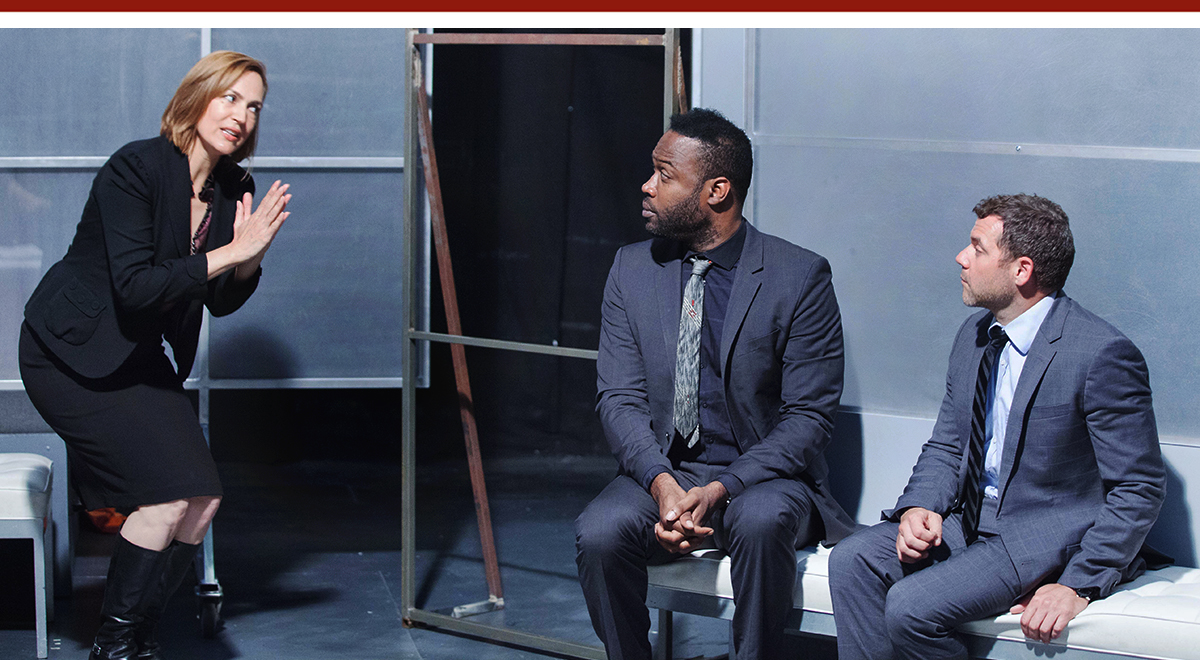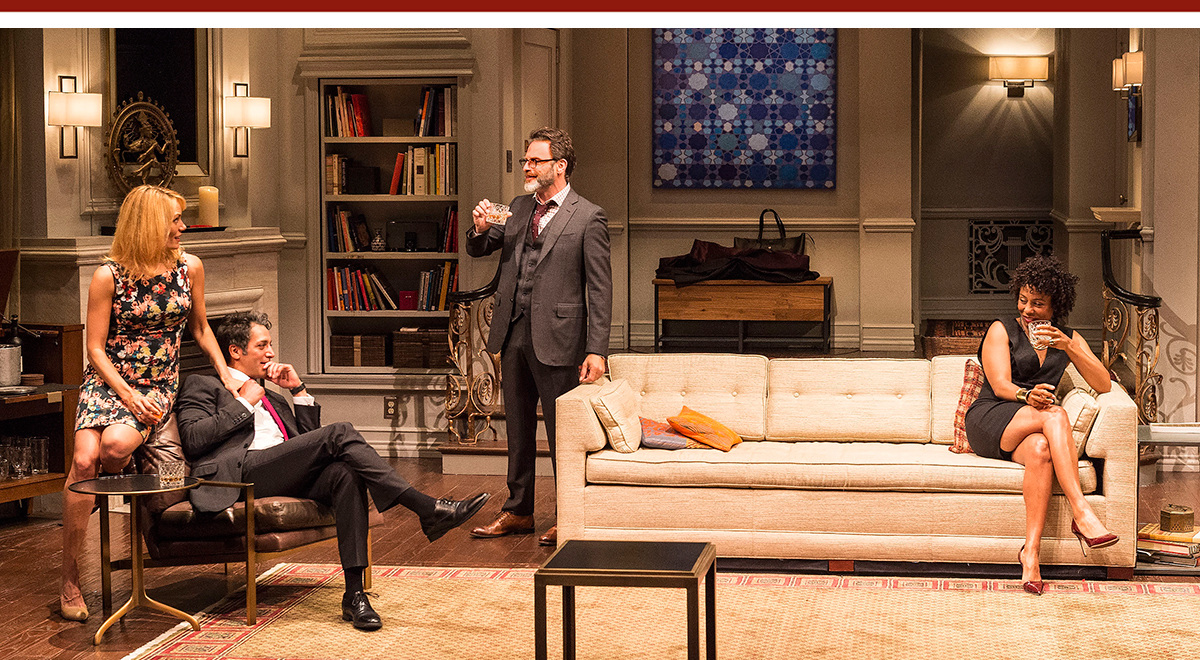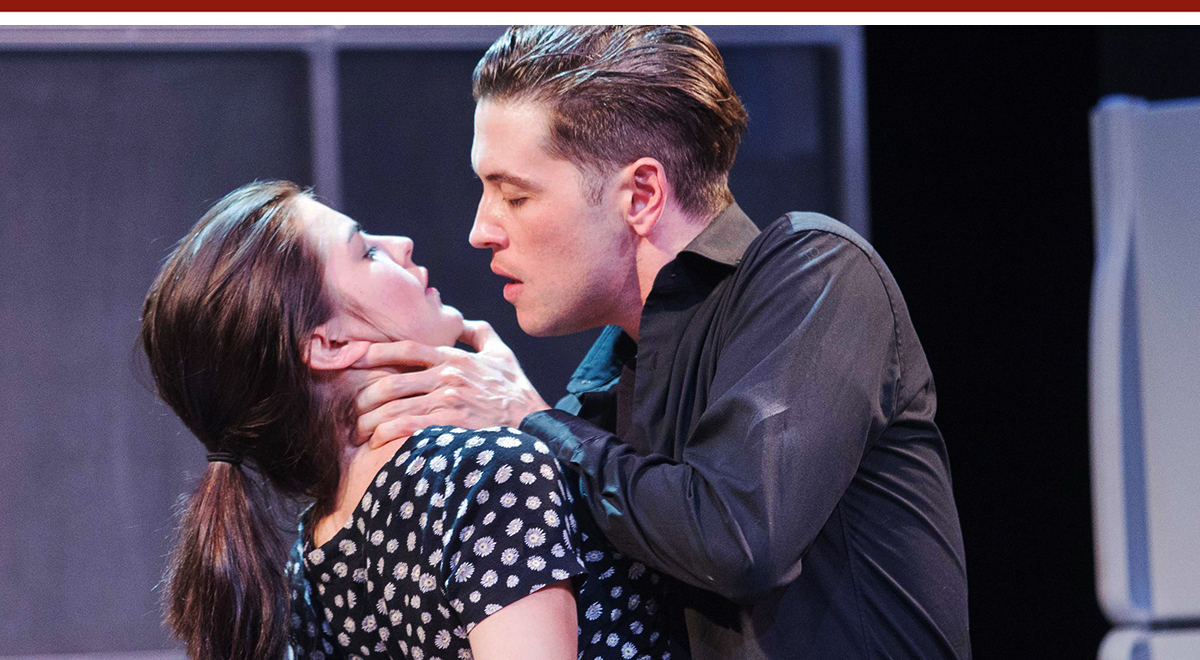Nativism
On the day Britain's vote to leave the EU mystified many of us, the consistent laughter for Alexandra Gersten-Vassilaros' Big Sky at the Geffen Playhouse (through July 17), and the three-fifths majority standing ovation, mystified at least one of us.
So, take this with a grain of salt.
Gersten-Vassilaros' play, shepherded by the Geffen and supported by the Edgerton Foundation, was muddled when not predictable and too often director John Rando had his actors compensate for the lack of surprise in the comedy by yelling. The effort to push the script towards farce only succeeded in making the shallow shrill. While the play has heart, and Rando has a superior cast, the well-trod themes feel worn. An indication of the script's developmental challenge is that, as recently as program deadline, it was 25 minutes shorter.
The banner cast is led by Jon Tenney (Good People, Speed-The-Plow) as Jack and Jennifer Westfeldt as his wife Jen. Having seen Tenney enhance a half-dozen productions since Substance of Fire at the Taper, it's safe to say if he couldn't give his character character, no one could. Similarly, Westfeldt, a writer-director-actor whose films like the delightful romantic comedy Friends with Kids are full of the life that is missing here, is wasted in a losing battle with the dreary Jen.
Scenic Designer Derek McLane's bravura set is the expansive wood-walled interior of an Aspen trophy home with a soaring ridge of snow-capped mountains filling the floor-to-ceiling upstage windows. Jen is nervously on a call with, we will discover, a man whose terminal cancer went into remission thanks largely to her volunteer care. A romance blossomed between cancer survivor and caregiver, and as soon as Jack enters we understand why. His myopic preoccupation with work has Jen feeling adrift.

After his excitement over gifts of expensive wine and chocolates further exposes how self-centered Jack is (he grazes through the box of candy, taking half-bites and replacing the balance), he is off for a meeting with the man he hopes will hire him and boost his income astronomically. As he hurries out, Jonathan (Arnie Burton) enters. Alone since the death of his longtime partner, he's been invited along by gal pal Jen to spend time with friends and get confirmation from Jack that the second half of a big loan is coming to complete the launch of a pillow-importing business.
After Jonathan gets Jen to divulge the specifics of her estrangement from Jack, her new affair, and her intention to leave her husband, she must rush off to take Jack his phone. Enter Tessa (Emily Robinson), the couple's teenage only-child. Spotting Jonathan absentmindedly rolling a joint of his prescription ganja, she easily overcomes his resistance to share and Robinson manages to provide the play's first engaging scene. She gives Tessa's tale of infatuation with the elevator operator in her family's Manhattan high-rise a resonating mix of marijuana and puppy-love giddiness.
The object of her affections is Catoni, an older Native American whose name means "Big Sky." Like a cultist, she apes his head-turning aphorisms about the dangers of mistreating mother nature, a clear refute of her father's preoccupation with wealth.
The play's cathartic turn will come after Tessa ends up in a car accident after hitting a buffalo. In the car with her is the daughter of the man Jack hoped would hire him. On the front seat of the damaged vehicle is the bag o'pot Tessa pilfered from Jonathan, who will reluctantly admit the provenance after it's in the police report and helps put the kibosh on Jack's career leap. Now Jack must reluctantly admit he had leveraged everything to maintain their lifestyle and, with the new job now denied, the family is broke: Jonathan's pillows will not be imported; the high-rise apartment is gone. The way Gersten-Vassilaros has given each character some responsibility in the events leading up to the calamity is admirable, and the best feature of her script.
Suddenly a powerful storm causes a power outage and the luxury lodge is suddenly as inhospitable as a 19th Century log cabin. Family and friend are thrust back to the harsh reality of Native Americans and Jack takes charge, With the furniture he starts a fire on the front doorstep, and as they huddle around the glowing pyre, there's a suggestion they are united by a sense of what is really important. Unfortunately, that togetherness likely has no more shelf-life than the rising embers or falling snow. Or, without some continuing work to shake off its triteness, Ms. Gersten-Vassilaros' script.
Big Sky has been given a luxurious premiere stocked with great talent. While the story and writing do not achieve the heights of the physical production and acting potential, she does have that artful reminder of our shared responsibility for what befalls us. That certainly is a valuable takeaway as we approach November's mystifying ballot choice.
top of page
BIG SKY
by ALEXANDRA GERSTEN-VASSILAROS
directed by JOHN RANDO
GEFFEN PLAYHOUSE
June 7 – July17, 2016
(Opened June 15, reviewed June 24)
CAST Arnie Burton, Emily Robinson, Jon Tenney, Jennifer Westfeldt
PRODUCTION Derek McLane, set; Denitsa Bliznakova, costumes; Jaymi Lee Smith, lights; Jon Gottlieb, music/sound; Steve Rankin, fights; Phyllis Schuringa, casting; Elizabeth A. Brohm/Maggie Swing, stage management
HISTORY Recipient of the Edgerton Foundation New Play Award. Co-produced by Dede Harris Productions with major support provided by the Edgerton Foundation New Play Production Fund. World premiere
Arnie Burton, Emily Robinson, Jennifer Westfeldt and Jon Tenney, top; inset, Robinson and Burton
Darrett Sanders
Shooting the bull
Mike Bartlett's 2013 Bull is a kind of surrealist nightmare comedy about the competitive brutality of man, the cruel indifference of natural selection, or both. As three sales people wait to meet the boss regarding their futures with the company, two try to get the third to simply quit. Jennifer Pollono has directed a revealing West Coast premiere of the 50-minute one-act at Rogue Machine Theatre, as part of the Hollywood Fringe Festival.
Whether it's just an exaggerated, impersonal version of office politics or a malevolent game played for enjoyment, team members Isobel (Lesley Fera, Rosalind) and Tony (Kevin Daniels) have clearly planned their taunting takedown of Thomas (Darius De La Cruz, in for Joshua Bitten). They tell him he is without the reports the boss asked for, insisting he misheard Tony's earlier instructions. They ridicule him, challenge his sexuality, his stamina, and his value to the company. By the time Carter (Alex Whittington) arrives for the meeting, it's a weakened Thomas who insists he is still an asset.
Unfortunately, Carter seems in on it, too, as he ignores the junior team member and repeatedly asks his name. His choice to terminate Thomas seems preordained, the fatal final sword-thrust that caps Bartlett's matador metaphor. But this is more than a clever transfer of the bullring to business. It seems inevitable that Thomas, clearly more sensitive and humane than Isobel and Tony, the play's picadors, the two horseback riders who pierce the bull's muscle before the matador arrives, must be cut from the herd, and the heard. Bull, which also stands for the constant flow of bullshit from Isobel and Tony, is a cautionary reminder that despite millions of years of evolution and socialization, the beast still stalls in our psyche.
Pollono and Designer Marissa Maynes have even added bullfighter red to the wardrobes of all but Thomas. The lining of Isobel's jacket looks cut from a matador's cape while Tony and Carter wear blood-red socks under suits of an identical cut and color. Thomas' suit is only slightly different, but that's enough. Pollono wants to make it clear that Thomas is "the other."
In a political season where the natural born are being urged to alienate the newcomers in the name of job security and economic stability, Bartlett's exercise in survivalism-of-the-fittest is especially sobering. As Will Shortz might ask in a Sunday morning quiz, "What word can be added to the titles of Mike Bartlett's two recent RMT productions, Cock and Bull, to characterize the spirit of those works? The quizmaster would be looking for a "fight," which in both scripts is what the central character has on his hands.
Fera, Daniels and Whittington have created characters who excel at flagrant duplicity, shifting between concern and hostility for Thomas. De La Cruz made his character a true every man. We sense a life outside the play in which real fears and insecurities, unspecified by Bartlett, make Isobel and Tony's targeting even more painful to watch.
Coincidentally, his appearance recalls the first RMT production reviewed by Theatertimes. It was a matinee of Rajiv Joseph's Gruesome Playground Injuries, and Tania Verafield and Ryan Mulkay were playing to their first audience. They were flawless. This performance of Bull also marked De La Cruz' first audience, which came after a single run-through earlier that day. It was a remarkable feat, going far beyond simple preparedness and investment to shared insight. Another great moment in L.A. acting that, fortunately, we were able to keep from going unrecorded.
top of page
BULL
by MIKE BARTLETT
directed by JENNIFER POLLONO
ROGUE MACHINE THEATRE
June 8-July 16, 2016
(Opened, Rev’d 6/25e)
CAST Joshua Bitten, Kevin Daniels, Lesley Fera, Alex Whittington, U/S Darius De La Cruz, Fiona Hardingham
PRODUCTION Stephanie Kerley Schwartz, set; Marissa Maynes, costumes; Dan Weingarten, lights
HISTORY World premiere in February 2013 at the Crucible Studio Theatre, Sheffield, England, and transferred to New York's 59E59 Theaters that April as part of Brits Off-Broadway Festival. West Coast Premiere
Lesley Fera, Kevin Daniels and Joshua Bitten
John Perrin Flynn
Dinner with enemies
The Pulitzer Prize for excellence in arts and journalism, which traces its name and funding to a newspaper publisher, found a perfect selection for its 2013 drama category. As art, Ayad Akhtar's Disgraced is exceptional drama. But it also has the impact of an extended human interest profile that gets to the heart of a complicated global issue.
Here, an American of South Asian ancestry, seemingly insulated within a successful marriage and Manhattan law career, loses everything in the wake of a misinterpreted gesture of goodwill, a regrettable venting of pent-up resentment, and a physical outburst of jealousy echoing Shakespeare's Moor. It is a masterful display of writing that exposes the effects of ethnic prejudice, religious intolerance and bygone colonialism in a play as textured and tightly woven as ancient tapestry.

The play's relevance and importance only deepened in the four years it took Disgraced to make its way from Chicago world premiere to celebrated Lincoln Center run and finally to the Mark Taper Forum, where it continues through July 17. Kimberly Senior (Sex with Strangers), who helmed the Chicago and New York productions, again provides clarifying direction that delivers without editorializing.
Amir Kapoor (Hari Dhillon) is the American son of a father born in pre-partitioned India and a mother born following the 1947 creation of Pakistan. Such innocent distinctions are the subtle shapers of Amir's backstory. Raised Muslim, he long ago turned his back after seeing the Quran as an anachronism written by 7th Century desert people who relied on violence and misogyny to survive. A one-time public defender, he is now a corporate lawyer at the threshold of partnership with Leibowitz, Bernstein, Harris. His wife Emily (Emily Swallow), an American-born Caucasian, may also be about to see her career skyrocket. Isaac (J Anthony Crane) is a curator at the Whitney who is coming by their apartment to consider her paintings for an upcoming show.
Idealistic Emily approaches Islam through its art, which she has been incorporating into her recent work. She credits the religion with a fundamental if unacknowledged role in Western cultural and urges Amir to counsel the Imam of his nephew, Hussein Malik (Behzad Dabu). Pakistan-born Malik, so eager to assimilate that he now goes by the name Abe Jensen, is outraged that his innocent Imam has been arrested, charged with raising funds for Hamas. Reluctantly, Amir attends the hearing.
While Amir belittles his nephew's name change, Malik reminds him that he is just as guilty of hiding his identity. By using Kapoor instead of his true last name, Abdullah, he has avoided prejudicial ties to Muslims. His boss' thank-you gift of a Siva statue shows that he has succeeded in having his office assume he is Indian and probably Hindu.
After a New York Times story erroneously suggests Amir is part of the Imam's defense team, his Jewish bosses quietly begin to re-evaluate his pending partnership, and offer the advancement to Jory (Karen Pittman), an attorney in the office who is African American and married to Isaac. The bulk of the play is a single scene, a dinner party Emily hosts for Isaac and Jory. It begins in celebration of Isaac's announcement that Emily is part of the Whitney show. But things gradually deteriorate. Repressed grudges and a long-ago infidelity are revealed in an explosion of ill-will that destroys friendships and threatens the marriages.
Ms. Senior's cast, most of whom have previously appeared in Disgraced, know exactly how to let the tension build organically based on Akhtar's carefully constructed plot. Once the unraveling begins, it is both unstoppable and heartbreaking. Meg Fister gets casting credit. The physical production, with set by John Lee Beatty, costumes by Jennifer von Mayrhauser, lighting by Christine A. Binder and sound design by Jill BC Du Boff, is immaculate.
Some years, America's top drama honor has been called into question with claims the judges were improperly swayed, or biased, and failed to fully consider the field. The Taper's production of Disgraced is proof that no such prejudice should be charged for 2013.
top of page
DISGRACED
by AYAD AKHTAR
directed by KIMBERLY SENIOR
MARK TAPER FORUM
June 8-July 17, 2016
(Opened 6/19, Rev’d 6/25e)
CAST J Anthony Crane, Behzad Dabu, Hari Dhillon, Karen Pittman and Emily Swallow; u/s – Courtney Rackley, Jenelle Lynn Randall, Thaddeus Shafer, Moneer Yaqubi
PRODUCTION John Lee Beatty, set; Jennifer von Mayrhauser, costumes; Christine A. Binder, lights; Jill BC Du Boff, music/sound; Meg Fister, casting; David S. Franklin/Brooke Baldwin, stage management
HISTORY Premiered in January 2012 at American Theater Company, Chicago, with Kimberly Senior directing. Ms. Senior directed the New York premiere at Lincoln Center in October of that year with Aasif Mandvi and Heidi Armbruster as Amir and Emily. A Broadway production evolved with Gretchen Mol as Emily, Hari Dhillon as Amir, Danny Ashok as Abe, Karen Pittman as Jory and Josh Radnor as Isaac.
Emily Swallow, Hari Dhillon, J Anthony Crane and Karen Pittman, top; inset, Behzad Dabu
Craig Schwartz
Slow reveal
While boundary-pushing sex heats up among a large group in the living room, two of the guests separately steal away to the kitchen. Their meeting appears accidental. At 31, John is a veteran of these parties familiar with the line between pleasure and pain. Julie, the 20-year-old, may be inexperienced at pushing the limits of physical tolerance, but she will gradually reveal a gift for the deeper psychological cut in Kim Davies' surprising Smoke.
Their encounter, unfolding in real time over the 70-minute one-act, gets a compelling West Coast premiere at Rogue Machine Theatre (through June 25) as part of the annual Hollywood Fringe Festival. Director Lisa James' carefully choreographed staging allows the tension to build slowly to the play's frightening climax and unsettling final moments.
John (Patrick Stafford) and Julie (the fast-rising young Emily James) are actually connected through Julie's father, a world-renowned photographer. John is currently his intern. When Julie arrives, after John has settled in for his smoke, she seems slow to recognize him. But we begin to suspect she knows more than she lets on.
As long as the field of play is physical, and the game involves pushing the razor's edge of the body's tolerance, John is firmly in command. But when Julie slyly shifts to a battle of wits, and begins to attack John's self-confidence and his failure to launch a career, the cuts go far deeper. In the end, both will be undone. But in this strange interlude, Davies provides a subtle yet revealing take on the respective strengths of men and women.
James has the two fearless actors she needs for Davies' script to work. James made her Equity-qualifying professional debut in Rajiv Joseph's demanding Mr. Wolf at South Coast Repertory, and just appeared in Sarah Ruhl's Stage Kiss at the Geffen Playhouse. If Wolf was the former CSUF student's master's thesis, Smoke is her brief but spectacular doctoral dissertation. The restrained power and rage behind the girlish innocence is the caginess that defines the character, and the craft that commends the actor.
Stafford, so impressive in his previous LADCC Award-winning RMT appearance, also as John, in 2015's Cock, is again a force to be reckoned with. We see that his character is practiced at the art of deception, a requisite of this secretive lifestyle. But we also see him weaken as young Julie gets in his head and under his skin. John is first to exit the kitchen, leaving Julie alone. After presenting herself throughout as an occasional smoker who needs to bum her cigarettes, Julie pulls a pack from her purse. Suddenly, our suspicions are confirmed, and the look in James' eyes let us know just what John has been up against.
Congratulations to the unrelated Jameses, Stafford and Ms. Davies for giving the Rogues a powerful entry in this year's Festival.
top of page
SMOKE
by KIM DAVIES
directed by LISA JAMES
ROGUE MACHINE THEATRE
June 15-25, 2016
(Opened 6/15, Rev’d 6/25e)
CAST Emily James, Patrick Stafford; u/s Anna DiGiovanni
PRODUCTION Stephanie Kimberly Schwartz, set; Marissa Maynes, costumes; Dan Weingarten, lights; Christopher Moscatiello, music/sound; Matthew Glave, fights; Michelle Hanzelova, stage management
HISTORY Produced by John Perrin Flynn, Justin Okin and Jennifer Pollono.





